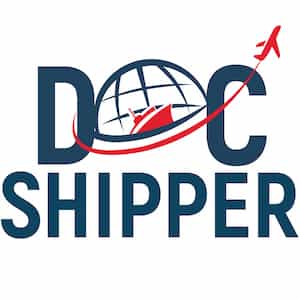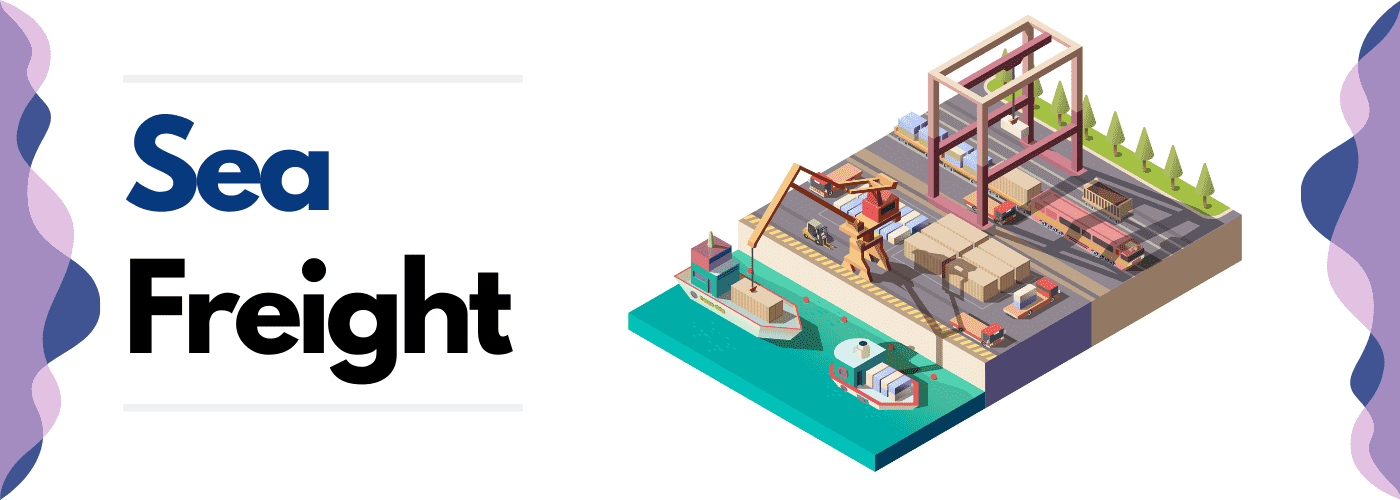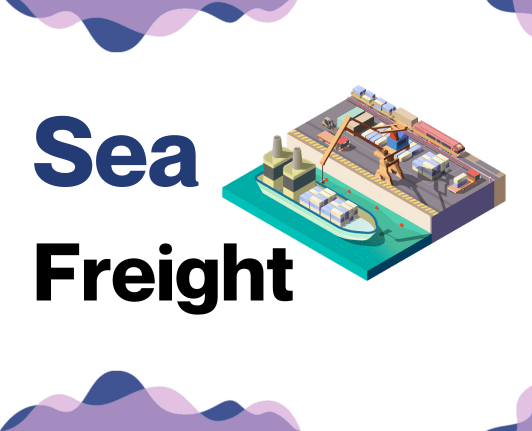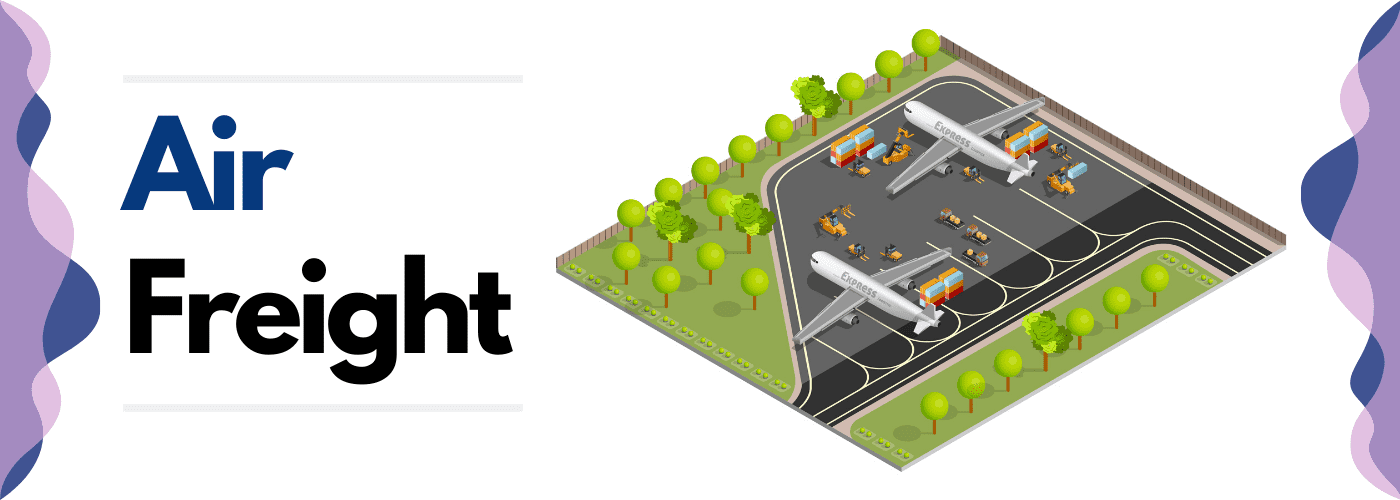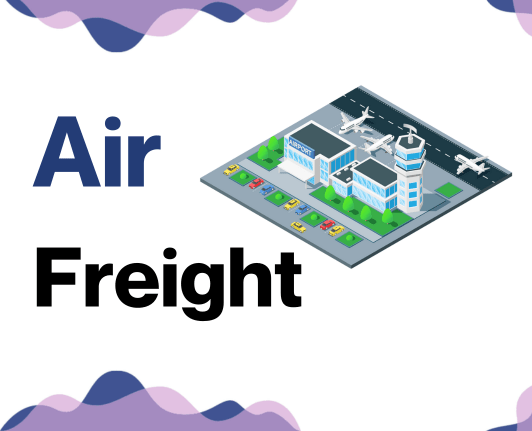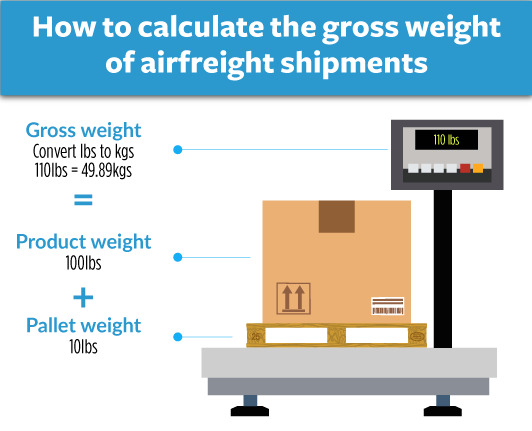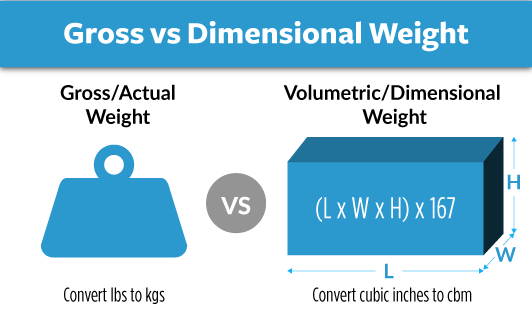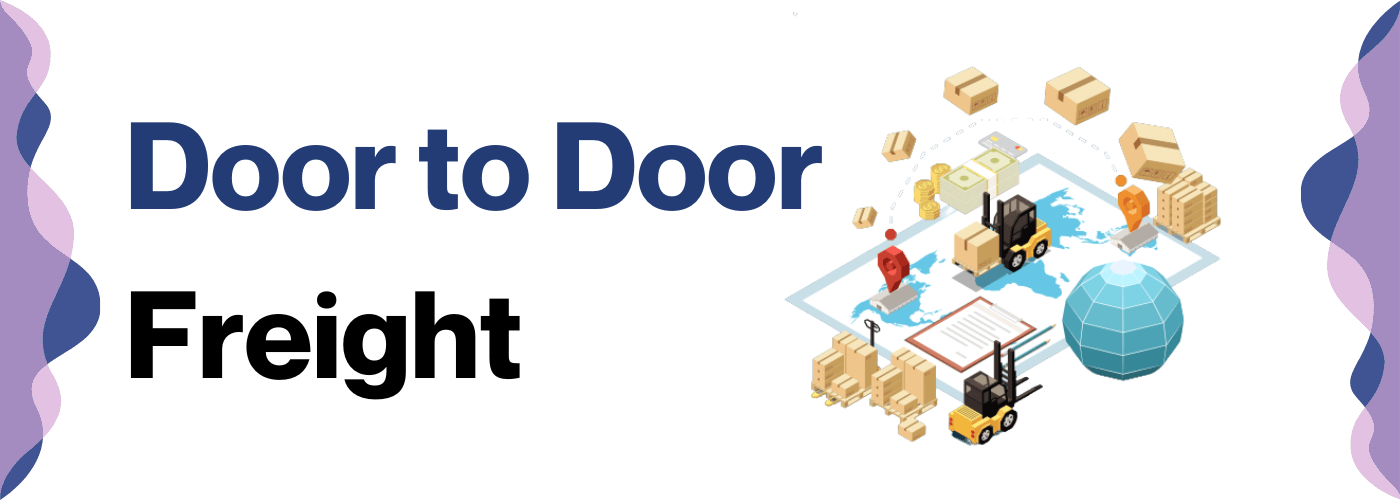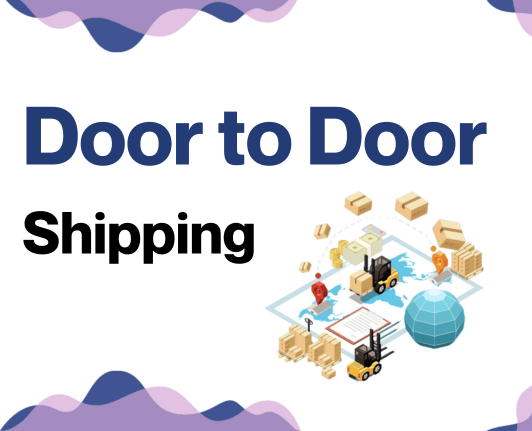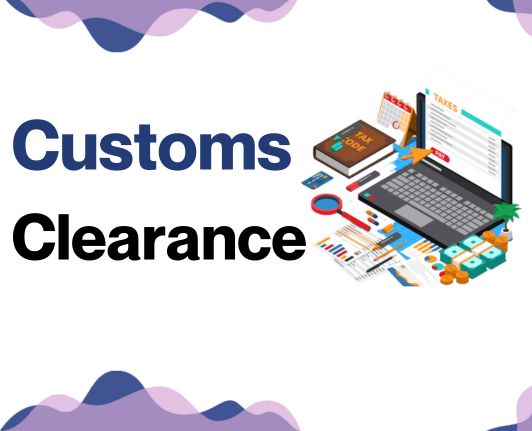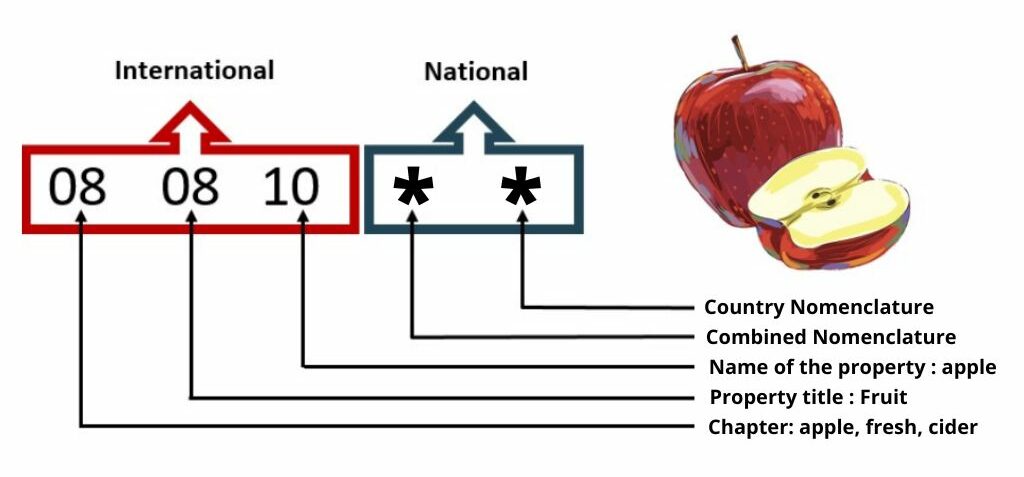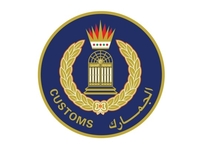Why did the package go on a vacation? Because it needed a 'parcel' of time off! That's a light-hearted jest, but coordinating freight transport from Malaysia to Bahrain is no laughing matter. With complexities ranging from understanding fluctuating rates and estimated transit times to nailing down elements of customs regulations, the logistics can feel daunting.
This guide is your comprehensive assistant. It sheds light on various freight options such as air, sea, road, or rail. We delve deep into the art of customs clearance, duties, and taxes, providing crucial insights tailored to promote your business success in the world of international shipping.
If the process still feels overwhelming, let DocShipper handle it for you! As a leading international freight forwarder, we expertly navigate every step of your shipping journey, turning potential headaches into triumphant business victories.
Table of Contents
Which are the different modes of transportation between Malaysia and Bahrain?
Malaysia and Bahrain, water-bordered nations, are oceans apart, but goods float between them as if stones skimming a pond. Air shipments avert watery paths, while sea freight hits the waves, both presenting viable shipping options. Each mode is a different key, opening distinct opportunities for businesses. Picking the best one? It's more than just a toss of a coin; it's aligning with your unique logistical needs. Think of it as choosing between an express elevator that rockets your cargo skywards or a sturdy boat calmly sailing on the unending blue waves - both have their own strengths and challenges.
How can DocShipper help?
Struggling with freight between Malaysia and Bahrain? Let DocShipper simplify it for you! Our expert team handles transportation, customs clearance, and paperwork. Your only task? Receiving your goods. Uncertainty isn't a luxury in your business. Get a free estimate in less than 24 hours. Have a question? Our consultants are a phone call away. Let's start this journey together, effortlessly!
DocShipper Tip: Sea freight might be the best solution for you if:
- You're dealing with hefty quantities or oversized goods. Sea transport is your go-to for maximizing space without stretching your budget.
- Time sensitivity isn't a concern for your shipment. Ocean freight is known for its leisurely pace, especially when compared to the speed of air or rail.
- Your supply chain connects key international harbors. This positions you to take full advantage of a wide-reaching network of ocean trade routes.
Sea freight between Malaysia and Bahrain
Brimming with economic activities, Malaysia and Bahrain are significant trade partners, linked by the azure straits. Port Klang and Penang in Malaysia seamlessly connect to the Bahrain Logistics Zone, serving as lifelines for businesses whisking goods from bustling Malaysian markets to Bahrain's vibrant coastal cities. However, the world of sea freight, while cost-effective for high-volume shipments, is not without its bottlenecks. It's a slower go-round, like a snail outrunning a hare, but offering the advantage of saving a pretty penny.
In this bumpy sea freight journey, shippers often face tidal waves of difficulties, navigating obscure customs regulations to juggling logistics, akin to a musician playing a symphony with no sheet music. But fret not! Even the trickiest of sea-songs has a rhythm to master. As we dive deeper into this guide, there is an ocean of best practices and specifications that can smooth your sea shipping sojourn from Malaysia to Bahrain, turning these challenges into stepping stones to successful shipping.
Main shipping ports in Malaysia
Port Klang:
Located on the west coast of Peninsular Malaysia, Port Klang is the nation's busiest port, handling over 14.6 million TEUs in 2023. It serves as a key node in global shipping.
Key Trading Partners and Strategic Importance: Port Klang plays a key role in trade with China, Singapore, Europe, and the USA. As Malaysia's primary port, it's strategically positioned near the Malacca Straits, one of the world's busiest shipping lanes.
Context for Businesses: If you're looking to penetrate Asian and European markets, Port Klang could be crucial due to its busy trade routes and comprehensive logistics facilities.
Port of Tanjung Pelepas:
Located at the western end of Johor, this megaport handles above 10.2 million TEUs in 2022. It's renowned for its efficiency and speed in container handling.
Key Trading Partners and Strategic Importance: The port has strong trading ties with China, Singapore, and the USA. Notably, it's the preferred port for the world's largest shipping lines: Maersk and Evergreen.
Context for Businesses: If speed and efficiency are vital to your operations, the Port of Tanjung Pelepas could be an integral player in your logistics plan, particularly for routes towards the Pacific and Indian Oceans.
Penang Port:
Located in the Malacca Strait, Penang Port is a smaller yet still significant port, managing around 1.5 million TEU. It is known for its diverse handling capabilities, including break-bulk, dry bulk, and liquid cargo.
Key Trading Partners and Strategic Importance: Its key trading partners include China, Singapore, and Indonesia. The port is strategically important as a northern gateway to Malaysia.
Context for Businesses: If your business deals with diverse product types, Penang Port, with its versatile handling capabilities, might play a crucial role in your shipping strategy.
Johor Port:
Found in the southern tip of Peninsular Malaysia, Johor Port is a multi-purpose port with a capacity of around 1 million TEU. It's particularly known for bulk and liquid cargo handling.
Key Trading Partners and Strategic Importance: It has strong trade ties with countries like Indonesia, Thailand, and China. It's also crucial due to its close proximity to the Next Generation Port in Tuas, Singapore.
Context for Businesses: If your business deals with bulk or liquid cargo, Johor Port's specialized facilities and strategic location make it instrumental for your shipping needs.
Bintulu Port:
Bintulu Port in Sarawak, East Malaysia, is a crucial hub for energy shipping, specifically Liquefied Natural Gas (LNG), handling around 25 million tonnes of LNG yearly.
Key Trading Partners and Strategic Importance: Its primary trade partners are Japan, South Korea, and Taiwan. The port is the world's largest LNG export facility, making it globally significant in the energy sector.
Context for Businesses: If you're in the energy sector, consider Bintulu Port for your shipping strategies due to its specialized LNG facilities and greater reach to eastern markets.
Labuan Port:
Located off the coast of Sabah, Labuan Port is a free commercial port mainly dealing with the importation of containerized and conventional cargo.
Key Trading Partners and Strategic Importance: Its primary trading partners are Brunei, Indonesia, and the Philippines. The port is strategically important due to its presence in the BIMP-EAGA (Brunei Indonesia Malaysia Philippines East ASEAN Growth Area).
Context for Businesses: Particularly if you're looking to import containerized and conventional cargo to East Malaysia, Labuan Port could be a key partner in your logistics strategies, considering its free trade status and access to key BIMP-EAGA markets.
Main shipping ports in Bahrain
Port of Khalifa Bin Salman
Location and Volume: Located in Hidd, this port is an integral part of Bahrain's trade due to its advanced facilities and strategic location, handling about 1.3 million Twenty-Foot Equivalent UnitsTEUs annually.
Key Trading Partners and Strategic Importance: The Port is a primary gateway for imports and exports for Bahrain, and also serves Saudi Arabia's eastern and central provinces. Major trading partners include countries such as Saudi Arabia, the United States, United Arab Emirates, and China.
Context for Businesses: If you're looking to capture the Gulf markets, particularly Saudi Arabia, or entering the Bahraini market, the Port of Khalifa Bin Salman may be your best choice due to its strategic position and high handling capacity.
Port of Mina Salman
Location and Volume: Situated in Manama, the capital of Bahrain, the Port of Mina Salman compliments the Khalifa Bin Salman Port by handling around 330,000 TEUs per year.
Key Trading Partners and Strategic Importance: Covering a range of cargo operations, including transshipment and regional distribution within the Gulf Cooperation Council GCC region and India, this port holds significant strategic value for traders.
Context for Businesses: If you're aiming to import or export smaller volumes of high-value goods, or need better access to Manama and its surrounds, the Port of Mina Salman may perfectly serve your needs with its robust infrastructure and proximity to the capital.
Port of Sitra
Location and Volume: The Port of Sitra is located towards the East of Bahrain and is dedicated to petroleum shipping, boasting storage capacity for large volumes of oil and gas.
Key Trading Partners and Strategic Importance: The port's key trading partners are concentrated in the energy sector. They include various Gulf countries, the US, and many others that Bahrain shares energy-related trade with.
Context for Businesses: For businesses in the oil and gas industry looking to export to international markets or import petroleum products, the Port of Sitra's specialized infrastructure and dedicated petroleum handling facilities may be a valuable asset to your supply chain goals.
*Please note that Bahrain may have other smaller ports and terminals, but the ones mentioned above are the key international ports that handle the majority of the country's maritime shipping.
To ensure accuracy, always verify the latest shipping procedures, regulations, and charges directly from each port's official website or contact them directly via their given communication channels on the website.
Should I choose FCL or LCL when shipping between Malaysia and Bahrain?
Choosing the most efficient method between consolidation and full container shipment from Malaysia to Bahrain can be a game-changer for your business. This process might seem overwhelming, but understanding FCL and LCL options will significantly optimize your shipping costs, timing, and overall success. Dive into this guide to gain insightful knowledge, weigh up the differences, and tailor the best shipping decision to your specific needs. The sea awaits!
LCL: Less than Container Load
Definition: LCL (Less than Container Load) shipment refers to shared freight shipping. If your cargo doesn't fill a whole container, it is grouped with other shipper’s goods in a single container.
When to Use: You might want to consider LCL freight, particularly when your cargo volume falls below the 13 to 15 Cubic Meter (CBM) mark. This option offers both cost-efficiency and flexibility for low-volume shipments.
Example: For instance, if you’re a small-scale electronics manufacturer in Malaysia looking to deliver 10 CBM worth of smartphones to a retailer in Bahrain, LCL freight would be your best choice.
Cost Implications: As you're sharing container space, costs are distributed among multiple shippers. Hence, LCL shipment can be less costly when dealing with smaller volumes. However, bear in mind that pricing can vary due to variables such as the density, cubic measure, and freight class of the goods. So, it's always optimal to take these factors into account when requesting an LCL shipping quote.
FCL: Full Container Load
In FCL shipping, you hire an entire container (FCL stands for 'Full Container Load'). It's generally the cheapest option for high volume freight, owing to the safety offered - your goods remain sealed within the FCL container from origin to destination, minimizing the risk of damage or theft.
Use FCL when your cargo exceeds 15CBM - that's around 70% of a 20'ft container's capacity. For instance, let's say you're shipping a large order of electronics from Kuala Lumpur to Manama that takes up 16CBM. FCL shipping for your cargo would be more economical and offer better protection against damage, as the goods remain within the same container throughout the journey.
Cost-wise, an FCL shipping quote generally includes the cost for the entire freight as opposed to a rate per unit volume/weight, making it cheaper for larger shipments. The exact price can vary, depending on whether you're filling a 20'ft or a 40'ft container and the nature of the goods being transported. However, consider other fees as well, like customs duties at Bahrain's ports or extra charges for specific types of cargo.
Unlock hassle-free shipping
Simplify cargo shipping with DocShipper! We're a dedicated freight forwarder committed to making your Malaysia to Bahrain shipping hassle-free. Our seasoned ocean freight experts consider key factors like shipping volume, budget, and time constraints to help you choose between consolidation or a full container. Ready to ship smarter, not harder? Contact us now for your free shipping estimate. Don't hesitate, your optimal shipping solution awaits.
How long does sea freight take between Malaysia and Bahrain?
Sea freight shipping between Malaysia and Bahrain typically takes around 20-45 days on average. These transit times vary due to factors such as the selected port of departure and arrival, the weight of the shipment, and the type of goods being shipped. For accurate and customized quote, it's recommended to contact a reliable freight forwarder - DocShipper can offer this service.
Below you will find a simple representation of the average transit times in days for sea freight between top ports in Malaysia and Bahrain:
| Malaysian Port | Bahraini Port | Average Transit Time (Days) |
| Port Klang | Khalifa Bin Salman | 25 |
| Penang Port | Khalifa Bin Salman | 27 |
| Johor Port | Khalifa Bin Salman | 31 |
| Bintulu Port | Khalifa Bin Salman | 37 |
Note: These times are estimates and actual days may vary. To plan any shipment, factor in port operating days and customs clearance times at both ends.
How much does it cost to ship a container between Malaysia and Bahrain?
The ocean freight rates for shipping a container between Malaysia and Bahrain can vary significantly, oscillating from as little as $50 to upwards of $500 per CBM. Accurate shipping costs hinge on multiple factors, such as your Point of Loading and Destination, the carrier used, the nature of your goods, and the ebb and flow of monthly market dynamics. While providing an immediate exact cost is challenging due to these dynamics, our proficient shipping specialists pledge to tailor the most competitive quote for your unique needs, ensuring you receive excellent value and comprehensive logistical support.
Special transportation services
Out of Gauge (OOG) Container
Definition: An OOG container is designed for items that don't fit within standard shipping containers due to their dimensions.
Suitable for: Ideal for large equipment, machinery, or unorthodoxly shaped items that surpass the constraints of traditional shipping containers.
Examples: Construction equipment like cranes, tractors, or large machinery parts.
Why it might be the best choice for you: This is ideal if your goods are oversized or irregularly shaped - it ensures your goods will be protected and carefully handled during transportation.
Break Bulk
Definition: Break bulk involves the shipping of loose cargo load, typically unitized or bundled onto pallets.
Suitable for: Ideal for handling smaller volumes of cargo, or fragile and special care items that need particular attention.
Examples: Drummed goods such as chemicals or oils, baled goods like paper or textiles, and bagged goods such as cement or grain.
Why it might be the best choice for you: Break Bulk allows for smaller batches of goods and provides a higher level of direct handling, ensuring product safety.
Dry Bulk
Definition: Dry bulk involves the transportation of homogenous, unpackaged commodities like grain or coal in large quantities.
Suitable for: Ideal for commodities like minerals, grains, metals, or energy materials.
Examples: Sand, coal, cement, fertilizers, or grains.
Why it might be the best choice for you: Dry bulk is your best bet if you're dealing with large quantities of uniform commodities, ensuring an economical and efficient mode of transport.
Roll-on/Roll-off (Ro-Ro)
Definition: Ro-ro vessels are designed to carry wheeled cargo, such as cars, trucks, semi-trailer trucks, trailers, and railroad cars, that are driven on and off the ship on their own wheels.
Suitable for: Ro-Ro is perfect for any wheeled cargo, from personal vehicles to large pieces of machinery.
Examples: Cars, trucks, semi-trailers, construction vehicles, or even railway carriages.
Why it might be the best choice for you: If your goods are also vehicles, the Ro-Ro option provides an easy and secure method of transportation.
Reefer Containers
Definition: Reefer containers are refrigerated shipping containers designed to carry temperature-sensitive cargo.
Suitable for: Perfect for any goods that require temperature control during shipment like food or medicines.
Examples: Seafood, dairy products, fruits, vegetables, or pharmaceutical products.
Why it might be the best choice for you: Ensuring your perishable or temperature-controlled products arrive at their destination in optimal condition.
Choosing the right shipping method relies heavily on understanding the specifics of your cargo. Whether, it's Out of Gauge cargo, break bulk, Dry bulk, a loose cargo load, Roll-on/Roll-off, or requires a ro-ro vessel or refrigerated containers - each method comes with its unique benefits. With DocShipper, not only do we provide the right solution tailored to your needs, we also provide a free shipping quote in less than 24 hours. Reach out and let's navigate these choices together!
DocShipper Tip: Air freight might be the best solution for you if:
- You're pressed for time or facing a non-negotiable deadline. Air freight delivers unparalleled speed when it comes to transit times.
- Your shipment is modest in size, falling under 2 CBM. Air freight is particularly well-suited for these smaller consignments.
- Your supply chain includes destinations that are off the beaten maritime or rail paths. Air freight gives you access to a comprehensive global airport network.
Air freight between Malaysia and Bahrain
Speeding your goods from Malaysia to Bahrain? Air freight is your ticket to prompt and reliable delivery. It particularly shines with small, high-value items - think fine jewelry or electronics. This route isn't just about speed though; it's a cost-effective choice for the right shipment.
Yet, shippers sometimes fumble, risking their budgets and delivery timelines. Picture this: You're packing for a flight and you underestimate your luggage weight. Ouch! Extra fees. It's the same with air freight - miscalculating weight can cause a shocking invoice. Knowing the ins and outs of air freight can mean big savings and smoother transportation - which we'll explore in the upcoming section.
Air Cargo vs Express Air Freight: How should I ship?
Feeling caught in a tailspin over choosing between Air Cargo and Express Air Freight for your next Malaysia to Bahrain shipment? Let's simplify: Think of Air Cargo as booking a seat for your goods on a commercial airline, while Express Air Freight is like having a personal jet exclusively for your items. We're diving right into the nitty-grity to help you map out the optimal air route for your specific business needs.
Should I choose Air Cargo between Malaysia and Bahrain?
Considering air cargo for your shipment from Malaysia to Bahrain? This mode of freight excels in cost-effectiveness when dealing with loads over 100/150 kg (220/330 lbs), providing an attractive choice for smaller cargoes. Airlines such as Malaysia Airlines and Gulf Air regularly offer reliable services along this route. While transit times may be longer due to fixed schedules, the reliability and predictability can fit well within your budget requirements. Whether you're a startup scaling up or an established company, air cargo might be an efficient solution for your shipping needs.
Should I choose Express Air Freight between Malaysia and Bahrain?
Express air freight, served by specialists like FedEx, UPS, or DHL, could be your perfect match for shipping less than 1 CBM or 100/150 kg of cargo. By prioritizing cargo over passengers, these services guarantee swift, efficient transportation between Malaysia and Bahrain. Ideal for urgent or high-value shipments, express air freight offers added security and faster customs clearance. So if timely delivery is crucial for your business, this service might be just the ticket. Make the firm choice, and let the likes of FedEx, UPS, or DHL pave the way for your shipping success.
Main international airports in Malaysia
Kuala Lumpur International Airport
Cargo Volume: Handles over 700,000 tonnes of cargo annually.
Key Trading Partners: Connections with China, Japan, the US, and Australia.
Strategic Importance: As Malaysia's primary airport, it operates as a key gateway to Asia and beyond.
Notable Features: KLIA hosts cargo facilities such as the Advanced Cargo Center, Malaysia's largest perishable goods handling center.
For Your Business: KLIA's extensive network and state-of-the-art facilities could be vital for your business's expansion plans in Asia and beyond.
Cargo Volume: Handles approximately 360,000 tonnes of cargo per year.
Key Trading Partners: Major freight services to China, Taiwan, Japan, and various ASEAN countries.
Strategic Importance: It's an important contributor to Malaysia's Northern Corridor Economic Region initiative.
Notable Features: Penang International is a hub for air cargo carriers catering to the high-tech industries in the Free Industrial Zones.
For Your Business: Offering convenient access to Penang's manufacturing sectors, this airport would be crucial for firms involved with electrical products and components.
Sultan Abdul Aziz Shah Airport
Cargo Volume: Approximately 120,000 tonnes annually.
Key Trading Partners: Primarily services local and private corporate clients in the ASEAN region.
Strategic Importance: Primarily used for corporate aviation, accommodating both domestic and international charter business flights.
Notable Features: Outstanding MRO (Maintenance/Repair/Overhaul) facilities such as Airod and Execujet.
For Your Business: This airport could be key if you're eyeing the region for potential business charters or planning frequent flights in and out of the ASEAN region.
Kuching International Airport
Cargo Volume: Handles nearly 27,000 tonnes of cargo annually.
Key Trading Partners: Primarily services cargo flights to and from East Malaysia, Indonesia, and Brunei.
Strategic Importance: As the fourth busiest airport in Malaysia, it's vital for the Borneo region.
Notable Features: It is an important logistic hub for rural air services and is widely used for cargo services, including farm produce.
For Your Business: Kuching could be essential to businesses in agro-based industries and those needing to connect to the network in Borneo.
Sultan Mahmud Airport
Cargo Volume: Handles about 100 tonnes of cargo per month.
Key Trading Partners: Direct cargo services to most of the ASEAN region.
Strategic Importance: Important for the East Coast Economic Region, especially in the oil and gas sector.
Notable Features: Sultan Mahmud Airport serves as a main entry point for large-scale projects happening in Terengganu state.
For Your Business: This airport may prove strategic for businesses involved in the oil, gas, and related sectors, providing smooth supply chain activities for projects in East Malaysia.
Main international airports in Bahrain
Bahrain International Airport
Cargo Volume: Each year, Bahrain International Airport facilitates over 400,000 metric tons of air freight.
Key Trading Partners: The United Arab Emirates, Saudi Arabia, India, and China are among Bahrain's top trading partners.
Strategic Importance: The Bahrain International Airport serves as a crucial hub in the Gulf region, strategically located and frequently used for transhipments across Middle East.
Notable Features: The airport features an advanced cargo terminal which is capable of handling all types of goods, ensuring that Bahrain can participate in global trade with a competitive edge. It also provides a Free-Transit Zone, cutting down international transit times and offering flexibility for businesses.
For Your Business: If your business regularly needs to transship goods across the Middle East, Bahrain's location and advanced facilities coupled with the Free-Transit Zone can bring about significant savings in cost and time. The extensive cargo handling capacity hints at a potentially faster customs clearance than smaller, less capable airports.
How long does air freight take between Malaysia and Bahrain?
Shipping goods via air freight between Malaysia and Bahrain typically takes an average of 3-5 days. However, it's crucial to understand that this timing isn't set in stone, as several factors can influence the transit time. For instance, the particular airports involved, the weight of the shipment, and the nature of the goods can all play a part in how swiftly your cargo reaches its destination. For a specialized and accurate estimation, it's worth consulting an experienced freight forwarder such as DocShipper.
How much does it cost to ship a parcel between Malaysia and Bahrain with air freight?
Shipping air freight between Malaysia and Bahrain has an expansive price range, averaging anywhere from $3 to $10 per kilogram. This variability is due to factors such as airport distance, parcel dimensions, weight, and the nature of the goods. It's crucial to note that these are only estimates, as we tailor pricing to each unique shipment. At our company, we're committed to delivering competitive and fair quotes, fine-tuned for your particular scenario. You're not just a number; you're a valued client with specific shipping needs. Contact us and receive a free, bespoke quote in less than 24 hours.
What is the difference between volumetric and gross weight?
Gross weight refers to the actual weight of your shipment, including packaging and pallets, measured in kilograms (kg). On the other hand, volumetric weight relates to the overall size of your shipment, and plays a huge role when shipping bulky, lightweight items.
For Air Cargo, the formula for calculating volumetric weight is Length (cm) x Width (cm) x Height (cm) / 6000. Let's consider a box with the dimensions 50cm x 60cm x 30cm. The volumetric weight is thus: 50 x 60 x 30 / 6000 = 15 kg (equivalent to 33 lbs).
In Express Air Freight, the calculation diverges slightly with a different division factor - it's Length (cm) x Width (cm) x Height (cm) / 5000. Using the same box for consistency, the calculation is now: 50 x 60 x 30 / 5000 = 18 kg (equivalent to 39.7 lbs).
You might ask why these weights matter. Simply put, freight charges are based on either gross or volumetric weight - whichever is higher. This ensures optimal use of cargo space, helping carriers offset the costs of transporting bulky but lightweight shipments.
DocShipper tip: Door to Door might be the best solution for you if:
- You value convenience and want a seamless shipping process, as door-to-door takes care of every step from pickup to delivery.
- You prefer a single point of contact, as door-to-door services typically provide a dedicated agent to handle all aspects of the shipment.
- You want to minimize the handling of your goods, reducing the risk of damage or loss, as door-to-door minimizes transitions between different modes of transport.
Door to door between Malaysia and Bahrain
Exploring the efficient way of international freight? Door to Door shipping-- a comprehensive service that takes your goods from origin in Malaysia directly to your destination in Bahrain, hassle-free. It's fast, reliable, and eliminates the need for multiple contracts, making it a top choice for businesses. Hang tight and let's dive into understanding its advantage for your global ventures!
Overview – Door to Door
Complexities in the shipping process can indeed daunt. That's where Door to Door shipping from Malaysia to Bahrain steps in, simplifying procedural challenges for businesses like yours. As DocShipper's most sought-after solution, it manages all logistics operations, from collection to the final delivery, reducing turnaround time and stress. Yet, it's important to factor in potential issues like strikes or delays. Balancing out such minor disadvantages, the prime benefits render it an ideal choice for businesses seeking a hands-off, stress-free approach. Hassle-free logistics is just a service away!
Why should I use a Door to Door service between Malaysia and Bahrain?
Who wants a rollercoaster ride when you can chill on a comfy couch? That's precisely the trade-off between standard shipping and opting for Door to Door service, particularly when shipping goods between Malaysia and Bahrain. Here are five reasons why you might want to sit back and choose this stress-free service:
1. Just Say No to Headache-Inducing Logistics: With Door to Door service, rest easy as your goods are picked up directly from the point of origin and delivered to their final destination. You can forget about dealing with the nitty-gritty of transit routes, sorting centers, or worrying about last-mile delivery.
2. Timely Delivery is the Name of the Game: Urgent shipments? No problem. This service comes with a stronger promise of meeting your tight schedules, as the whole delivery process is managed by one entity. Talk about getting things delivered in the nick of time!
3. Complex Cargo Gets VIP Treatment: Whether your goods need special temperature control, are oversized, or just plain tricky, Door to Door service has your back. It offers specialized techniques and equipment to ensure your shipment arrives undamaged.
4. Your Pocket Won't Run Dry: Surprisingly, using just one provider for the entire transportation process can save money. By bundling services, Door to Door providers often offer competitive rates, making your purse strings breathe a sigh of relief.
5. Truckin' Till The End: Lastly, this service covers trucking all the way to the final destination. No manual port-to-door transport, leaving you free to focus on your core business. After all, why juggle when you can delegate?
So if you are interested in eliminating that chaotic shipping circus and cherishing a smooth delivery experience, a Door to Door service might just be your new best friend!
DocShipper – Door to Door specialist between Malaysia and Bahrain
Sailing across seas or soaring through skies, DocShipper ensures hassle-free, door-to-door shipping between Malaysia and Bahrain. We're logistically proficient, covering everything from packaging to customs clearance using all available transportation modes. Plus, you'll have a dedicated account executive streamlining your journey. Need an estimate? Reach out for a free one within 24 hours, or consult with our experts at any time. We're ready when you are, taking the load off shipping so that you focus on what truly matters - your business.
Customs clearance in Bahrain for goods imported from Malaysia
Navigating the tricky waters of customs clearance—the formal process of ensuring imported goods comply with local regulations—can be a complex task, particularly when moving goods from Malaysia to Bahrain. With hidden traps like unscheduled fees and confusing trade regulations, understanding the ins and outs of customs duties, taxes, quotas, and licenses is crucial to avoid your goods getting sidelined. In the sections that follow, rest assured we'll dig deeper into these considerations, helping you conquer these common pitfalls. Remember, DocShipper can take the reins on this process worldwide, regardless of your goods' nature. Need a budget estimate for your project? Our team is ready and waiting—just provide the goods' origin, value, and HS code. We're here to simplify the seemingly intricate world of international shipping for you.
How to calculate duties & taxes when importing from Malaysia to Bahrain?
Navigating the route from Malaysia to Bahrain requires a clear insight into customs duties and taxes. These calculations rest on key factors - the country of origin, the Harmonized System (HS) Code, Customs Value, the Applicable Tariff Rate, and any additional taxes and fees specific to your products. Start with the country of origin—the initial stepping stone in this journey—it's crucial to establish where your goods were originally manufactured or produced. Get this first step right and you're set on a path to accurately pinning down those all-important duty and tax costs coming your way.
Step 1 - Identify the Country of Origin
Step 1 in estimating your duties and taxes begins with the identification of the product's country of origin - a vital preliminary step for five main reasons.
First, it determines the tariff treatment your goods will receive - a key factor when figuring out expenses. Next, it unveils any specific trade agreements that could lessen your tax burden. For example, Malaysia and Bahrain, members of the ASEAN-Australia-New Zealand Free Trade Area (AANZFTA), offer reduced tariffs for certain items.
Third, it highlights import restrictions. In Bahrain, goods like narcotic drugs, archaeological artefacts, and certain chemicals face strict regulations.
Fourth, the country of origin affects trademark laws, ensuring your product doesn't infringe on local business trademarks. Lastly, it can expose any anti-dumping laws that might affect you - these are measures to protect Bahrain's economy from imported goods sold cheaply.
The trick here is to take the time to delve into the country of origin's landscape. You will unravel customs intricacies that directly impact your bottom line. It might seem tedious, but it ensures you're well-prepared, and your shipment slides through customs smoothly, avoiding costly hold-ups. Remember, an ounce of prevention is worth a pound of cure!
Step 2 - Find the HS Code of your product
The Harmonized System Code, universally known as the HS Code, is pivotal to international trade. This internationally standardized system of names and numbers is used to classify traded products and greatly smoothens the process of shipping goods across borders by making them universally recognizable.
Your product's HS code carries significant weight in terms of determining the import duties, taxes, and regulations that apply to your shipment.
The easiest way to obtain the HS code is generally by asking your supplier, as they are likely to be well-acquainted with the goods being imported and the related regulations.
However, if this isn't possible, don't worry - we have a simple, easy-to-follow method for you. Start by using an HS lookup tool, specifically the Harmonized Tariff Schedule. From there, input the name of your product in the search bar, and head over to the Heading/Subheading column. This is where you'll find your product's HS code.
A word of caution - ensure you select the HS Code with utmost precision. A discrepancy in the HS code can result in shipment delays and potential fines, due to incorrect or unexpected customs procedures. Your product's HS code not only dictates the charges and duties but also the potential restrictions that might apply to the product.
Here's an infographic showing you how to read an HS code.
Step 3 - Calculate the Customs Value
If you're importing goods from Malaysia to Bahrain, it's key to understand that the customs value isn’t simply the price you paid for your goods. Sure, you bought that machinery for, say, $10,000 - but that's not your customs value! It's actually the CIF value - the Cost, Insurance, and Freight value. This means it's the total of the original price of your goods ($10,000, for example), plus the cost of international shipping ($2000 perhaps?), as well as any insurance costs (let's say $250). So in this example, your 'customs value' would be $12,250, not just the original $10,000 product cost. This is vital to complete your customs clearance with accuracy in Bahrain. Knowing the true customs value helps in preventing costly penalties and ensuring a fluent shipping process.
Step 4 - Figure out the applicable Import Tariff
An import tariff is a tax imposed by a country's government on foreign goods. For an item shipped from Malaysia to Bahrain, the applicable tariff is largely determined by its Harmonized System (HS) code. Tariffs in Bahrain follow the Harmonized System, which is globally recognized.
Here's how to find the appropriate tariff rate:
1. Consult Bahrain Customs' Tariff Schedule on their website.
2. Look for the HS code you determined earlier.
3. The assigned tariff will be listed next to it.
As an example, let's say you're importing a chair with the HS code 9401.30 which attracts a tariff rate of 5% in Bahrain. Assume your CIF costs are $500. The import duty calculated would therefore be 0.05500 = $25 USD.
Keep in mind, this is a simplified example and other taxes or regulatory fees might apply. It's always wise to seek advice from professionals or contact Bahrain Customs for any updates. Understanding import tariffs is crucial as they impact your product's final cost and, subsequently, your pricing strategy.
Step 5 - Consider other Import Duties and Taxes
Beyond standard tariff rates, you might face extra import duties based on your goods' country of origin and their type. For example, an excise duty could be levied on certain goods like alcohol or tobacco. If your goods are subjected to anti-dumping measures, you may also be liable for anti-dumping duties. So, if you're importing specific steel products (random example) from Malaysia potentially subject to anti-dumping, it's wise to inquire about such costs.
Arguably the most crucial tax you must consider is the Value-Added Tax (VAT). Bahrain currently levies a 5% VAT on the Cost, Insurance, and Freight (CIF) value of your imported goods. For an understanding, if your CIF value is $10,000, you'll pay $500 as VAT (10,000 x 5/100).
Remember, these are quick examples for illustration. Exact rates differ based on varying factors. Shortcomings in due diligence could have tangible financial implications, making a solid understanding of the necessary duties and taxes imperative. Having a reliable freight forwarder by your side can greatly alleviate these challenges.
Step 6 - Calculate the Customs Duties
Calculating customs duties in Bahrain for goods imported from Malaysia requires a keen understanding of different components: customs values, Value Added Tax (VAT), anti-dumping taxes, and Excise Duty.
Suppose you have a shipment priced at $10,000 with no VAT or anti-dumping taxes. The customs duty in Bahrain is 5%, so you'd pay $500 ($10,000 x 5%).
Now, let's assume the shipment cost is still $10,000, but there's a 10% VAT. First, calculate the customs duty: $10,000 x 5% = $500. Add this to the shipment cost: $10,000 + $500 = $10,500. Apply the VAT: $10,500 x 10% = $1,050. Your total due would be $1,550 ($500 + $1,050).
Lastly, picture a shipment worth $10,000 with a 10% VAT, 5% anti-dumping taxes, and 5% Excise Duty. Calculate customs duties ($500), VAT ($1,050), anti-dumping taxes ($500), and Excise Duty ($500). The total would be $2,550.
Don't let this complex process slow you down. DocShipper can manage every aspect of customs clearance efficiently and effectively, ensuring you are not overcharged. Reach out for a free quote within 24 hours and let us handle the logistics.
Does DocShipper charge customs fees?
As a seasoned customs broker in Malaysia and Bahrain, DocShipper doesn't impose any customs duties or taxes. Those go directly to the government. What we do charge is a service fee for customs clearance, ensuring your goods navigate the complex regulations smoothly. The paperwork from the customs office, which differs from our service charges, is provided, letting you see precisely how your money is allocated. So when you see a charge from us, remember, we're helping your shipments clear customs while you focus on your business.
Contact Details for Customs Authorities
Malaysia Customs
Official name: Royal Malaysian Customs Department
Official website: http://www.customs.gov.my/en/
Bahrain Customs
Official name: The Customs Affairs - Kingdom of Bahrain
Official website: http://www.bahraincustoms.gov.bh/
Required documents for customs clearance
Puzzled by paperwork for customs clearance? We're here to demystify the process. Our guide will break down essential documents like the Bill of Lading, Packing List, Certificate of Origin, and Documents of conformity (CE standard), helping turn the daunting into the doable.
Bill of Lading
Navigating the watery path from Malaysia to Bahrain is simpler with a Bill of Lading (BOL) in hand. Critical to your international freight journey, it essentially signs over ownership of your cargo upon delivery. Think of it like passing a baton in a relay, but with boxes and crates instead. Electronic or telex release BOL brings twin benefits of speed and security, removing paper's sluggish pace. Over airways, the AWB, the BOL's airborne cousin, takes over the reins. Here's a tip for the uninitiated: always keep a copy of your BOL or AWB handy, so you're equipped to tackle any freight curveballs Bahrain or Malaysia might throw at you. With these documents, your cargo isn't just stuff—it's a well-documented parcel finding its way home.
Packing List
Getting your goods from Malaysia to Bahrain punctually and in perfect shape is crucial, right? An essential tool to achieve this is your Packing List. Imagine it as the DNA of your shipment; it identifies your goods' specifics: the number and type of items, their weight, and dimensions. The accuracy in completing the Packing List can't be stressed enough. It's not just a vital tool for handling and shipping - it's the backbone of customs clearances for both sea and air freight.
Remember the last time you received a parcel, and it wasn't what you expected? That's a result of a poorly done Packing List. If details mismatch, your goods may face delays or charges. So next time you're shipping goods from Kuala Lumpur to Manama, make sure your Packing List is as accurate as a navy seal's aim. It's not just paperwork; it's your ticket to a smoother shipping experience.
Commercial Invoice
Crafting a perfect Commercial Invoice for shipping between Malaysia and Bahrain can seem daunting, but it doesn't have to be. This crucial document serves as a record of the transaction between the exporter and the importer. It essentially contains a description of the goods, quantity, cost, freight, and insurance along with marks and numbers of the package.
Here's the catch: Any minor inconsistency between your Commercial Invoice and other shipping documents can trigger unnecessary customs holds or delays. So, ensure all details match at all times, including your Bill of Lading or Air Waybill.
Pro tip: A little-known fact, double-check and validate the Harmonized System (HS) Codes, as they differ between countries. In this case, it's wise to be aware of both Malaysian and Bahraini customs interpretations. These tips should help you navigate the choppy waters of shipping more confidently.
Certificate of Origin
When you're shipping goods between Malaysia and Bahrain, the Certificate of Origin (CoO) plays a crucial role. The CoO is your golden ticket to prove where your goods were made. For instance, suppose you're exporting electronic equipment manufactured in Kuala Lumpur to Manama. By correctly citing 'Malaysia' as the country of manufacture, the CoO ensures you may benefit from preferential customs duty rates under international trade agreements, effectively reducing your shipping costs. So, never underestimate the influence of a correctly filled out CoO; it could mean the difference between smooth sailing or rough seas on your shipping journey between Malaysia and Bahrain. After all, who wouldn't want to trim down their expenses while ensuring a seamless transit?
Get Started with DocShipper
Navigating through customs can be daunting. With DocShipper at your side, there's no need to worry! Our expert team understands the ins and outs of the customs clearance process between Malaysia and Bahrain. Allow us to shoulder the stress and intricacies of cross-border shipping for you. Contact us today for a free, no-obligation quote — let's simplify your shipping process within just 24 hours.
Prohibited and Restricted items when importing into Bahrain
Understanding which items are off-limits or subject to restrictions in Bahrain can be a real headache. Mistakes can be costly and delay your shipments, potentially damaging your business reputation. Let's dive right into how to avoid these concerns when importing to Bahrain.
Restricted Products
- Pharmaceutical Products: To ship these goods, you have to apply for a license from the National Health Regulatory Authority (NHRA). Here's their official site that you can check out: NHRA
- Agricultural Goods: These products require an import permit from the Ministry of Municipalities Affairs and Urban Planning.
- Cosmetic and Personal Care Items: A Cosmetic Product Notification is necessary from the National Health Regulatory Authority. Apply for it here
- Livestock and Animal Products: For shipping these, you got to obtain a permit from the Veterinary Quarantine at Ministry of Works, Municipalities Affairs and Urban Planning.
- Precious Metals and Jewellery: You are required to get a permit from the Directorate of Precious Metals and Gem Testing at the Ministry of Industry, Commerce and Tourism.
- Radioactive Materials: To ship these goods, you must secure a license from the National Unit of Radiation Protection at the Ministry of Health.
*Please remember to ensure the products or goods to be shipped are not banned or prohibited in Bahrain, in addition to obtaining these necessary permits. Be sure to double-check everything in advance to prevent any shipment interruptions or legal issues.
Prohibited products
- Alcohol products not suitable for human consumption
- Narcotic drugs
- Newspapers, drawings, books, photographs, movies, and any other items that might offend Islamic teaching or public ethics
- Pearls of all types
- Weapons, explosives, and ammunition
- Radio/remote controlled model aircraft
- Gambling devices and machines
- Pork and pork products
- Dangerous waste, toxic waste
- Israeli currency, such as the Shekel
- Items with imprints or logos of the Boycott of Israel
- Live swine
- Tobacco and its manufactured derivatives.
Are there any trade agreements between Malaysia and Bahrain
Yes, there are trade relationships that can work in your favor when shipping between Malaysia and Bahrain. Currently, both countries are active members of the Association of Southeast Asian Nations (ASEAN), offering advantageous opportunities with logistics and import/export procedures. There's booming interest in bolstering this relationship, with talks of direct sea links that could simplify and expedite freight transit. However, there is no specific Free Trade Agreement (FTA) or Economic Partnership Agreement (EPA) yet. Understanding these evolving dynamics can give your business the competitive edge it needs.
Malaysia - Bahrain trade and economic relationship
Malaysia and Bahrain share a rich trade history, boosting their economies over decades. Key sectors like petroleum products, manufacturing, and electrical and electronic equipment are pivotal, creating robust economic links. Specific milestones include the booming bilateral trade volume, which hit nearly $195 million in 2023, highlighting the thriving partnership.
Investments between both nations have also flourished. Bahrain's direct investments in Malaysia totalled $24.2 million in 2022, spanning sectors like finance and insurance. Conversely, Malaysia's real estate projects in Bahrain totalled approximately $61 million in 2022. Prominent commodities include petroleum oils, palm oil, and air conditioning machines, cementing the nations' interdependence in trade.
This trade relationship demonstrates the mutual benefits of their partnership, with expectations of continued growth and mutual prosperity. Understanding this dynamic allows businesses to optimize their transportation decision-making process between these countries.
Your Next Step with DocShipper
Unsure about handling the complexities of your Malaysia-Bahrain shipping? Let DocShipper simplify it for you. Say goodbye to arcane customs rules and confusing freight logistics. Our team is equipped to handle everything, from paperwork to transport. So why wait? Start stress-free shipping with DocShipper today. Reach out to us and let us streamline your international shipping journey.
Additional logistics services
Explore beyond shipping and customs with DocShipper! We handle the entire supply chain, ensuring a seamless journey for your freight from start to finish. Discover a universe of additional logistics services tailored just for you.
Warehousing and storage
Finding that perfect warehouse, especially one offering essential features like temperature control for your goods, can be one big puzzle. Picture this: it's a sunny day, your chocolates are melting, and your profits? They aren’t too happy either! No worries, we're here to help you avoid such unforeseen hiccups. More info on our dedicated page: Warehousing.
Packaging and repackaging
When shipping between Malaysia and Bahrain, your goods' safety is paramount. Proper packaging and repackaging alleviates damage risks, ensuring safe delivery. And that's where a reliable agent comes in. From textiles to electronics, efficient packaging matters! Consider ceramic vases, improperly packed, they could crack; or electronics, which require anti-static bags for optimal protection. More info on our dedicated page: Freight packaging.
Cargo insurance
Transporting goods isn't like keeping them in a secure vault. Picture a moving target of risks ranging from damage, theft, to delays. That's where Cargo Insurance steps in, providing cover distinct from your fire insurance. Think of it as a safety net, catching unforeseen incidents like a container falling into the sea. Invest in peace of mind, protect against potential monetary loss. Find all the details you need to know on our dedicated page Cargo Insurance.
Supplier Management (Sourcing)
Looking to manufacture in Asia or Eastern Europe? DocShipper is here for you. We streamline the procurement process, from finding the right suppliers, interpreting business language, to guiding you through the entire procedure. Picture toiling less with paperwork and language barriers, and focusing more on what you do best—growing your business. More info on our dedicated page: Sourcing services.
Personal effects shipping
Looking to move from Malaysia to Bahrain with fragile or bulky items? Trust our Personal Effects Shipping services for professional care and flexibility. Picture securely transporting grandma's antique vase or your favorite oversized painting - we've got you covered. Discover more at our dedicated page: Shipping Personal Belongings
Quality Control
Ensuring your goods meet Bahrain's stringent quality standards while manufacturing in Malaysia is crucial - think of it as your preemptive strike against customs issues! Picture being at ease as our meticulous inspections catch an unintended plastic component in your export bound electronic product, avoiding hefty penalties. Quality Control is no mere fancy term; it's your ally in transnational trade! More info on our dedicated page: Quality Inspection
Product compliance services
Ensuring that your goods comply with destination regulations is crucial to avoid hiccups in international logistics. Our Product Compliance Services include laboratory testing to secure necessary certifications, keeping you trouble-free during customs clearance. It saves you from potential fines, delays, or even product seizures. A real-world example? Imagine shipping electronics with non-compliant plugs – a recipe for disaster! Avoid such pitfalls with our help. More info on our dedicated page: Product compliance services.
FAQ | For 1st-time importers between Malaysia and Bahrain
What is the necessary paperwork during shipping between Malaysia and Bahrain?
When shipping from Malaysia to Bahrain, several important documents need to be prepared. Rest assured, we at DocShipper manage the bill of lading for sea freight, or the air way bill for air freight, directly on your behalf. Meanwhile, you'll need to provide us with the packing list and commercial invoice at a minimum. Depending on the nature of your goods, there may be additional paperwork necessary, such as Material Safety Data Sheets (MSDS) or various certifications. We'll guide you throughout the whole process to make sure all documentation requirements are completely fulfilled. This is to ensure a smooth and undelayed customs clearance process.
Do I need a customs broker while importing in Bahrain?
Indeed, we at DocShipper highly advocate for utilizing a customs broker when importing goods into Bahrain. Given the intricacies involved in the process and the need for certain mandatory documents, a customs broker proves to be invaluable. Their expertise in handling customs interactions eases your burdens and improves the efficiency of the entire process by ensuring accuracy in the details provided. Importantly, we reassure you that for most shipments, DocShipper will represent your cargo at customs, providing a smooth and stress-free experience for your business.
Can air freight be cheaper than sea freight between Malaysia and Bahrain?
We understand how crucial it is for you to choose the most economical shipping between Malaysia and Bahrain. While it's challenging to determine whether air freight is cheaper than sea freight, as this decision rests on variables like route, weight, and volume, there's a key point to keep in mind. If your consignment is less than 1.5 Cubic Meters or weighs under 300 kg (660 lbs), air freight could conceivably be a more feasible option. Regardless of the scenario, we at DocShipper ensure that your dedicated account executive always delivers the most competitive pricing choice tailored to your logistics requirements.
Do I need to pay insurance while importing my goods to Bahrain?
While we don't require you to pay for insurance during the import process to Bahrain, we strongly advise you consider it. Insurance isn't mandatory in shipping, but it does offer vital protection. Many unforeseen incidents like damage, loss, or theft can occur during transport, and an insurance policy is your safety net to recover your investment. Though it represents an additional cost upfront, the potential financial risk without it could be much steeper. With insurance, you're covered and can carry out your shipping operations with peace of mind. So, we at DocShipper recommend factoring insurance cost into your budgeting for a smoother, safer shipping experience.
What is the cheapest way to ship to Bahrain from Malaysia?
We recommend sea freight for shipping goods from Malaysia to Bahrain as it's the most economical option due to the two countries' proximity. While slower than air freight, the cost savings are significant, making it an ideal choice for non-urgent shipments. Ensure to plan ahead for possible delays and to navigate customs regulations in both countries effectively.
EXW, FOB, or CIF?
We advise basing your choice on your relationship with your supplier, but remember, they might not be a logistics expert. At DocShipper, we highly recommend allowing an experienced agent to oversee at least the international freight and destination processes. Suppliers usually sell under EXW (Ex Works, from their factory door) or FOB (Free On Board, covering charges up to the origin terminal). Don't worry, though. Regardless of the chosen term, we can facilitate a comprehensive door-to-door service to ensure smooth transportation, streamlining the process for you.
Goods have arrived at my port in Bahrain, how do I get them delivered to the final destination?
When your goods arrive at their destination port in Bahrain under CIF/CFR incoterms, you'd usually need to appoint a customs broker or freight forwarder to help with clearance and final delivery. However, at DocShipper, we offer a comprehensive DAP service where we handle the entire process for you. Confirm this service with your dedicated account executive for a smoother shipping experience.
Does your quotation include all cost?
Absolutely! Our comprehensive quotation encompasses all costs, with the exception of duties and taxes at your shipment's destination. You're invited to request an estimate of those from your dedicated account executive at DocShipper. We make it a point to ensure transparency and avoid hidden charges, so there won't be any unexpected surprises.
